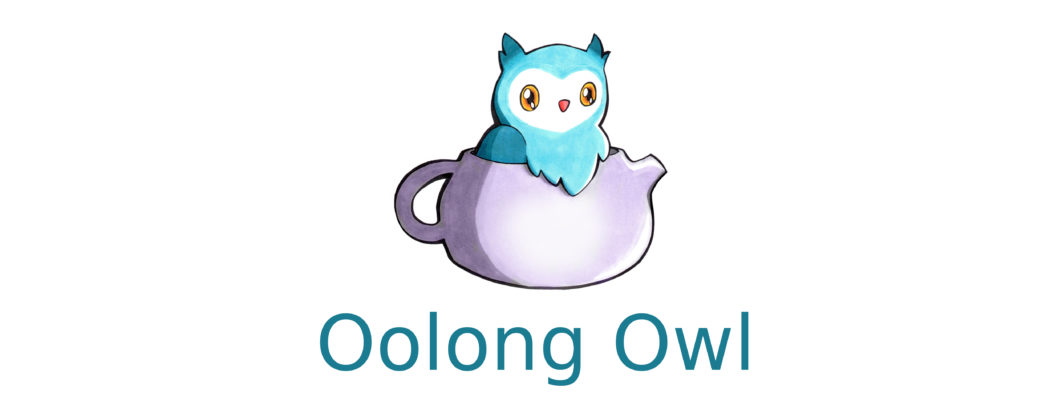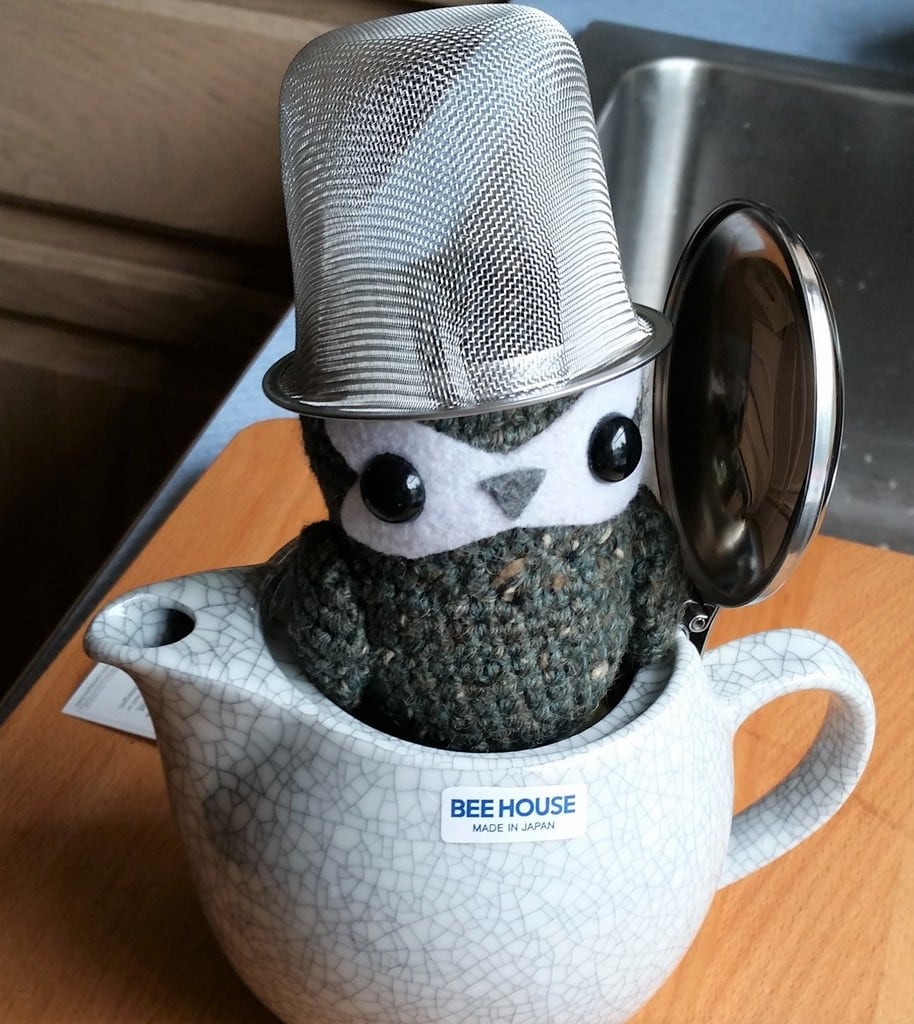Hoot hoot! I am back with another round of teas from Puerh.uk!
On the menu today is 2007 Xi Zi Hao – Xue Shan Chun Lu (Spring dew), 1990s JiangCheng, and 1990s Xiaguan BaoYan JinCha Custom.
2007 Xi Zi Hao – Xue Shan Chun Lu (Spring dew)
This is Mengku Da Xue Shan, old wild tree material. The leaves have a sweet wildflowers scent.
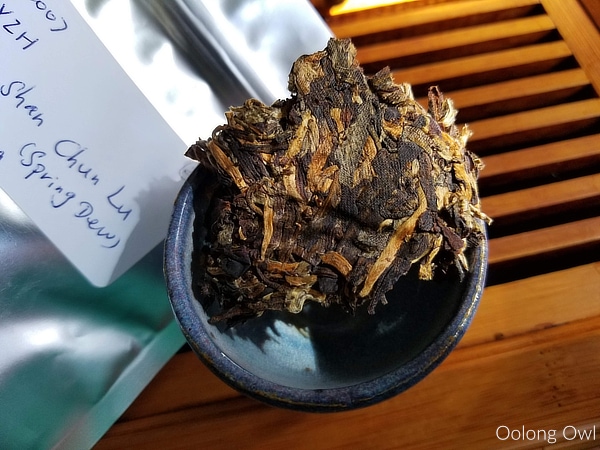
For all teas today, I used a gongfu ratio of 1 gram of leaf per 15ml, steeped at a boil. After a steep, the leaves shift to an amber and honey wooden scent.
First, Second, and Third Infusion: 2007 Xi Zi Hao – Xue Shan Chun Lu is a sharp, crystalline tree resin, with sweet maple wood to start, and the woody note echos at the end of the sip. Some sips are a bit cardboardy but mostly woody. The texture is buttery silky, leaving an oily feeling on the lips.
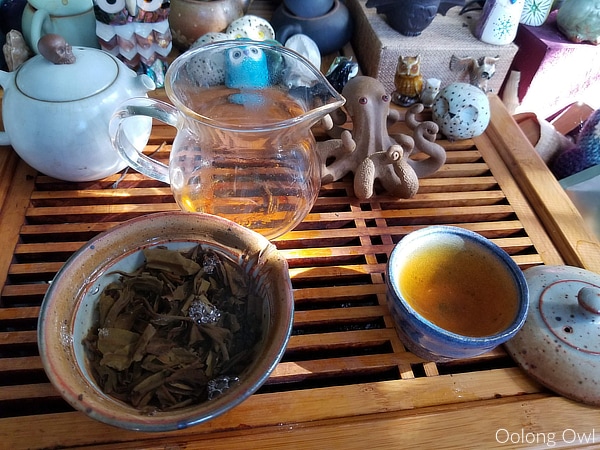
Fourth and Fifth Infusion: Complex city! Some sips have a jasmine floral wisp, others a bruised dry peach, all while mostly honey wood. There is an astringency tickling the back of the throat, but then it goes away after a sip, thinking I was only imagining things… then it comes back a touch later. The aftertaste is pretty light, but I have the strong urge to keep drinking to keep the astringency at bay.
Sixth, Seventh, and Eighth Infusion: I gave the leaves a sniff and they changed to a wild medicinal scent. 2007 Xi Zi Hao – Xue Shan Chun Lu is opening up more wooden cupboards with old cardboard boxes, with a resiny amber sharp flavor. Some sips slink in a medicinal date flavor, others like withering apple leaves, but a lot of sappy maple wood and medicinal leaves. I feel some pressure at my temples, but I am using most of my concentration to unravel all the complexities of this tea. The astringency is a little bitey, drying the tip of my tongue.
I am not sure where this tea is trying to take me – a boxed antique shop or a wild autumn forest that was an abandoned orchard. While I was refilling my water, I was certainly tea drunk and floaty feeling. I also lost 30 minutes somehow.
Ninth, Tenth, Eleventh, and Twelfth Infusion: These final infusions are crystalline, sappy rock sugar, hints of river water with driftwood, and some old box flavor. Some sips have a bit of amber still in them. The astringency doesn’t rise at all, still just a tip of the tongue feeling, so is pretty welcoming.
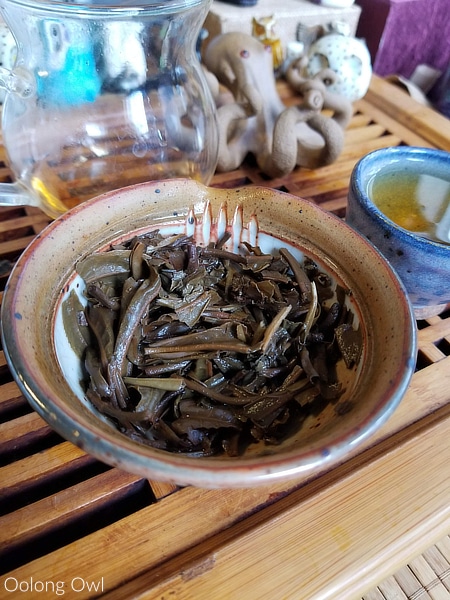
2007 Xi Zi Hao – Xue Shan Chun Lu is a woodsy, complex tea with hints of age. So much going on with this tea, all with great texture and feel. It is a tea that is easy to get lost in. Complex teas are fun as there are lots to figure out but also great conversation tea group tea. I quite enjoyed the notes, though I am an aftertaste chaser, which this tea didn’t have much of.
1990s JiangCheng from Puerh.uk
This is a custom produced, Taiwanese natural storage tea at a great price!
I don’t typically drink this old often, it makes me way too hot feeling, and I’m drinking this in summer. The leaves smell nutty and gently dank. After a rinse, it smells of old forest floor and nuts.
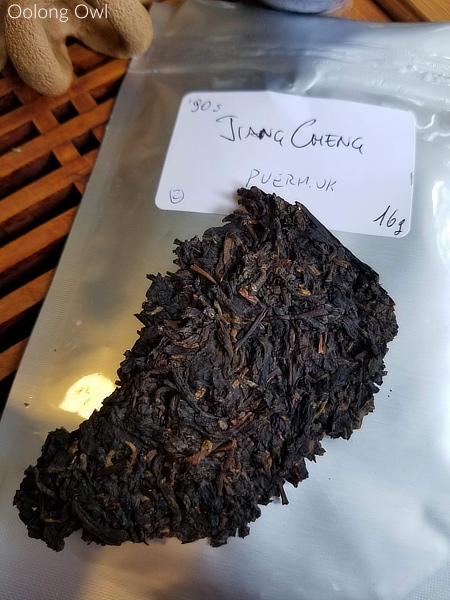
First and Second Infusion: I was braced for ultra dank, but this is pretty clean. It has a warm, medicinal hazelnut shell. It’s sweet and smooth, the texture is balmy.
Third, Fourth, Fifth, and Sixth Infusion: I was worried I underleaf 1990s JiangCheng, but I was wrong – this tea got strong and just needed to open. The flavor is sharp old cedar wood, strong nut shells. Some sips have a buzz of frankincense and myrrh. As I paused to get more water, there is a concentrated dry bruised peach skin flavor.
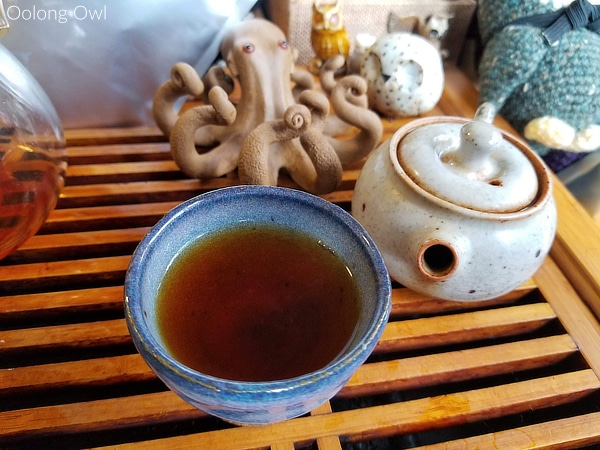
Seventh, Eighth, and Ninth Infusion: 1990s JiangCheng is starting to lose the intensity and less sharp/intense tasting, blacked bruised peaches, medicinal date, and cedar. I am getting some astringency, applying a layer of dryness to the top of the tongue. This adds a deep woodsy fruity aftertaste that lingers and sticks. I’m feeling pretty chill and relaxed here.
Tenth, Eleventh, Twelfth, and Thirteenth Infusion: 1990s JiangCheng is light and sweet, changing completely to a meld of sweet nuts, wood, and blackened fruit. There are hints of medicinal, but overall sweet and easy to drink. I keep steeping for 20-30 minutes and still get flavor and scent off the leaves. The last infusions are sweet resin and wood. This would be a good candidate to stove boil to finish this tea off.
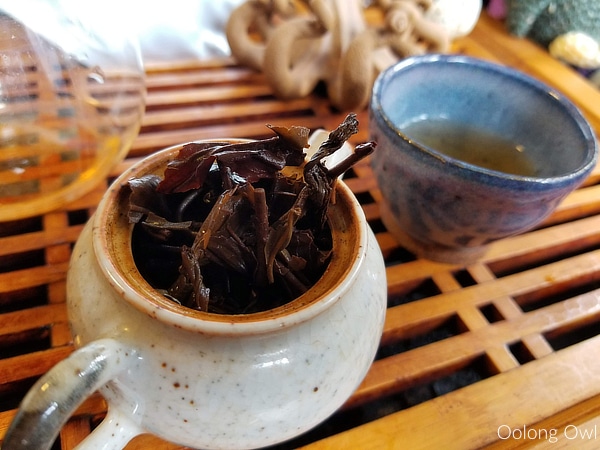
1990s JianCheng stacks up as being nicely aged and smooth, without offensive flavors, so low on the dank factor. The flavors are fairly consistent but go from sweet to intense, to softly meld to a relaxing session. Despite not being much of an old tea drinker, I enjoyed the later infusions and the mood.
1990s Xiaguan BaoYan JinCha Custom
This JinCha is promised to be of higher quality, less broken up leaf than the average BaoYan Jinchas.
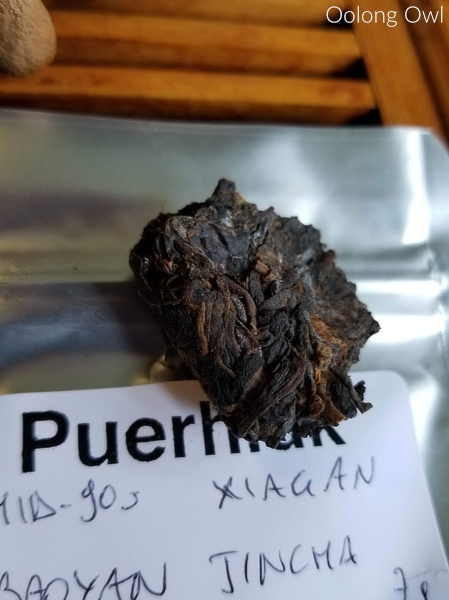
1990s Xiaguan BaoYan JinCha Custom has an old carpet scent, but not too funky. The steeped leaves smell like soggy boiled funky nut skins.
This sample of mine has insane compression. I wanted to break off for a smaller gaiwan session and was tough! Puerh.uk does offer this jincha broken up for an additional fee and that might be worth it if you cannot be bothered and will be drinking soon.
First, Second, Third, Fourth, and Fifth Infusion: The flavor starts off strong! 1990s Xiaguan BaoYan JinCha Custom has a wild old berber carpet taste. Some sips of herbal medicinal sage, old wooden furniture, all with a melted butter texture. The aftertaste is light, woody, and of paper towels.
I immediately am getting my head in a vice feeling and eyebrow vibrating. Also starting to get sweaty but not unpleasantly so.
Sixth, Seventh. Eighth, and Ninth Infusion: I can’t count anymore, 1990s Xiaguan BaoYan JinCha is slamming with energy and I kept meaning to write “Fifth” infusion and looked up at my screen and I didn’t. And this happened at least three times. I know it’s the tea and I’m not crazy. That said, do not trust my steep count here. The flavor is sharp bitter medicinal cedar wood and sage, somewhat similar to the previous tea but heavier, darker flavor.
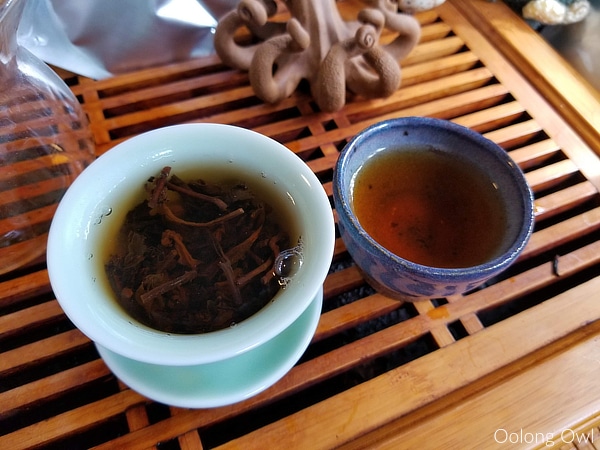
I am seriously distracted but doing 3 things at once, all while losing track of time and space. It’s a spacey tea, all with a fluttery headache.
Tenth, Eleventh, and Twelfth Infusion: 1990s Xiaguan BaoYan JinCha is lightening and tastes like zesty herbal sage and wood, but softer and sweeter. I did long infusions here, walking off for 30 minutes here and there to do things. The final long infusion was a medicinal weedy sage flavor. This tea is also a good candidate to stove boil the last infusion out.
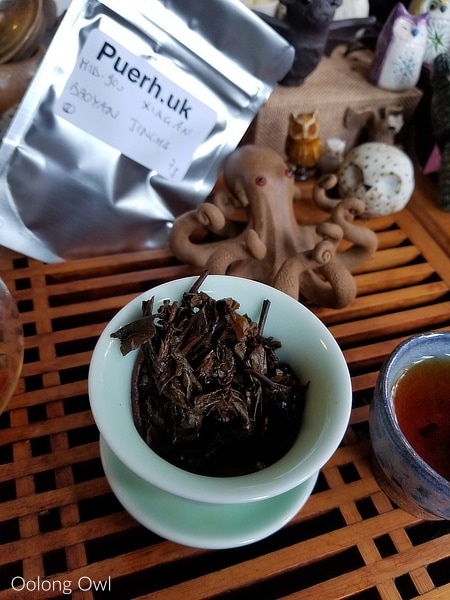
1990s Xiaguan BaoYan JinCha Custom had some HK storage then Taiwanese storage and it shows with the big richer flavor, but time to drop the dank. The notes are strong and medicinal wood with high tea drunk factor.
Overall I am impressed with these aged teas. I’ve encountered a lot of more HK storage mega funk and makes me feel off, and the storage on these is a lot more pleasant and clean. As stated in the last review of Puerh.uk, this seller has limited stock, so do not procrastinate if you want their teas.
(teas provided for review)





